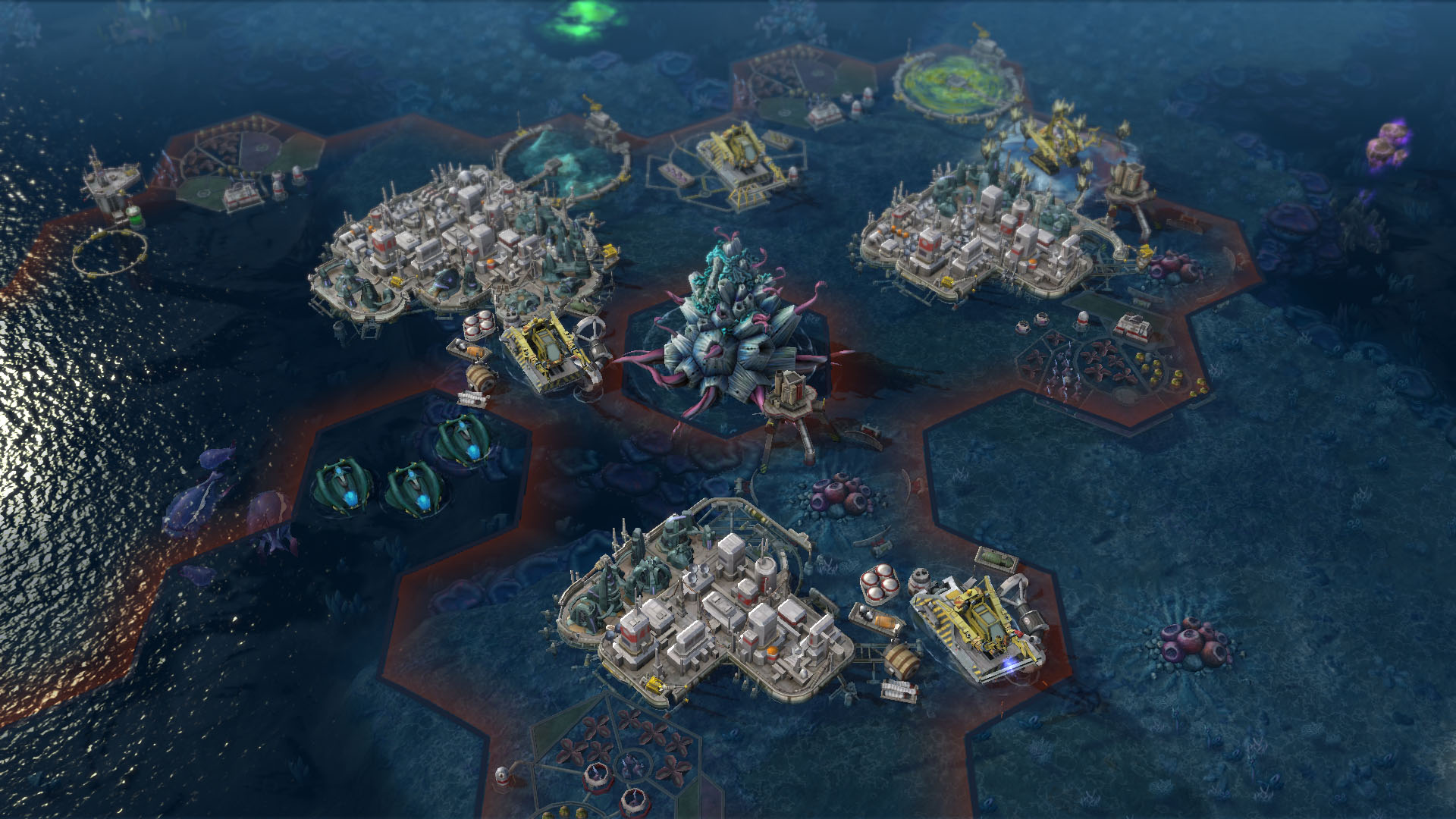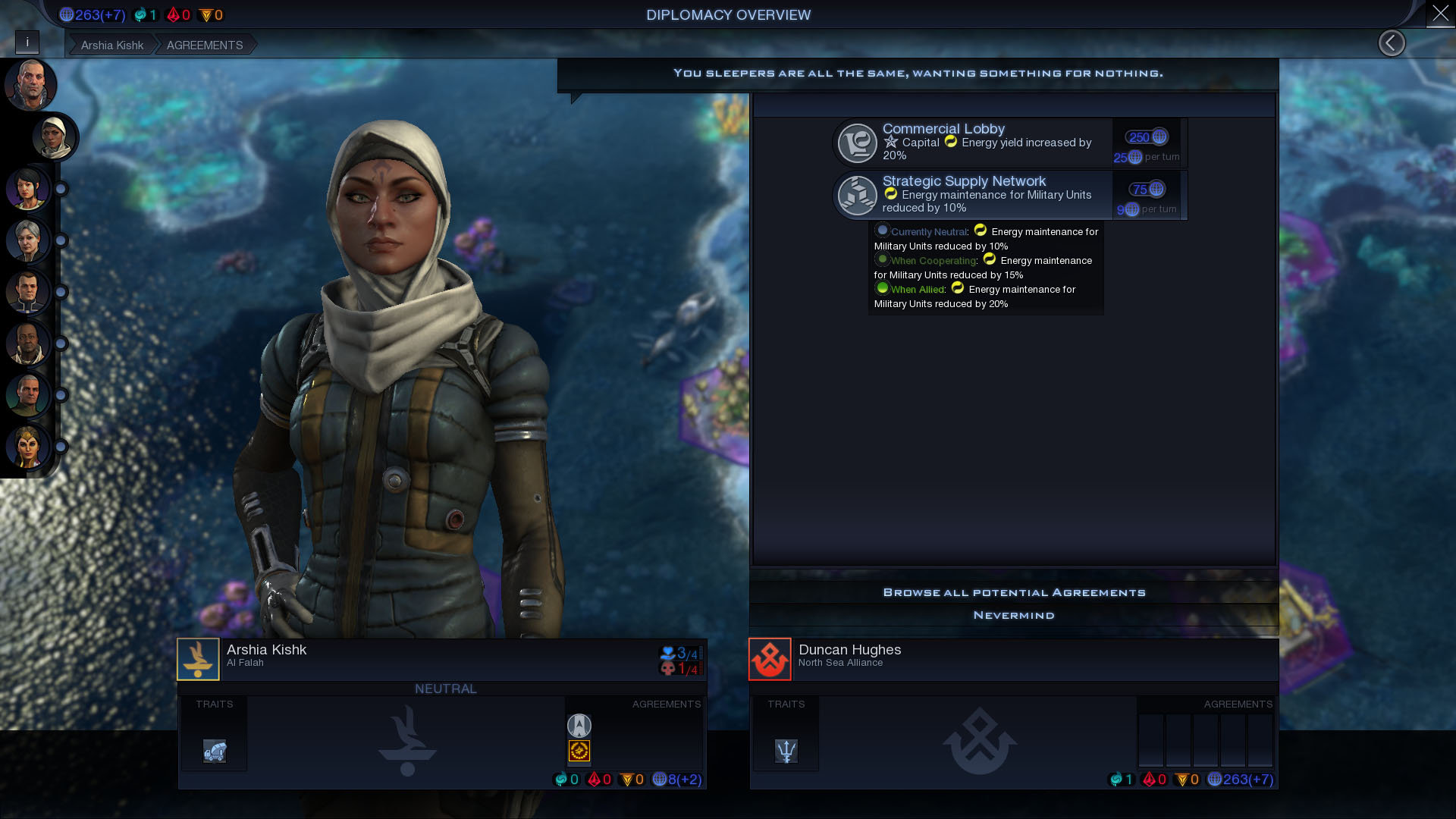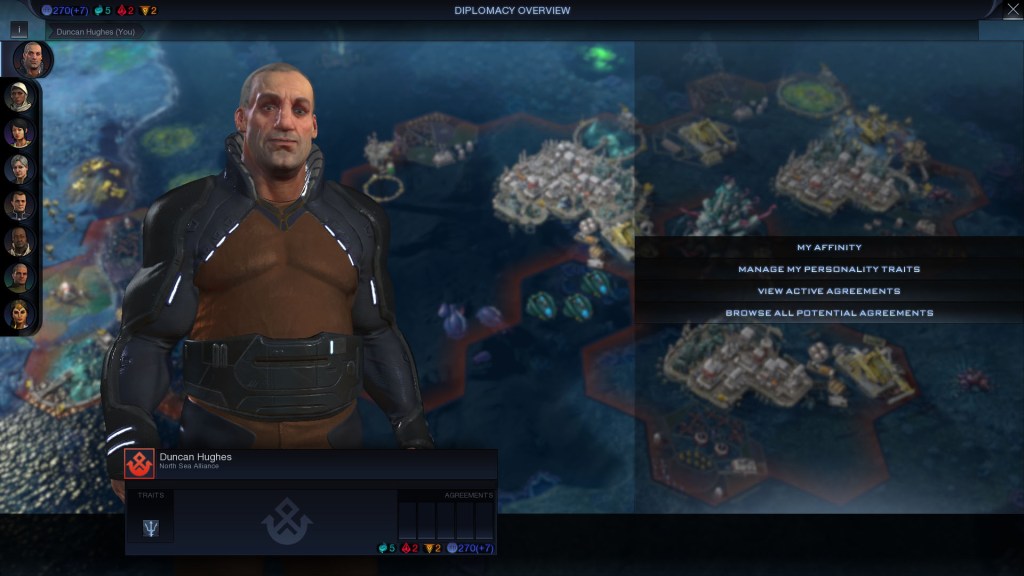Turning of the tide.
Despite receiving high scores from critics, Sid Meier's Civilization: Beyond Earth has received clamorous fan reaction on all fronts. Just take a quick look at the game's Steam page and you'll find an audience that's fairly split in their recommendation. The negative user reviews, though, have several complaints in common: The game feels too much like Civilization V with a futuristic skin, the aliens act more like obstacles, the affinities limit which technologies players need to research, leaders lack personalities, and there's little incentive to trade with other civilizations. Beyond that, it just didn't have much replay value.
Rising Tide, the upcoming DLC expansion for the game, hopes to alleviate these problems by reworking diplomacy from scratch, introducing ocean-based cities and a procession of minor improvements that provides so many options for customization that no two games should play exactly the same. In fact, Rising Tide rewrites so much of the core Beyond Earth gameplay that it could be imagined as, for all intents and purposes, a sequel.
Diplomacy Finally Gets A Reboot
As enticing as it is to begin this preview with the shock and awe of floating ocean cities, it became clear as I was playing the game behind closed doors at a private 2K event that the core upgrade in Rising Tide is the new diplomacy system that kicks its predecessor out of the water. Very little remains the same. Apart from each leader keeping their unique perks, including the two new corporations Al Falah (bonus to city processes) and North Sea Alliance (bonus to aquatic cities), how leaders interact with each other is far more intricate.
Every turn, each civilization generates diplomatic capital which essentially acts as a separate currency; and that's no exaggeration as you can purchase units and buildings with diplomatic capital just like energy if you absolutely need it. Diplomatic capital is primarily used to form agreements with other civilizations and to expand on your leader's personality traits. All leaders begin with a trait (essentially a perk) that comes with a paired agreement that other leaders can purchase from you, and over the course of the match, you can acquire three additional traits, upgrade those traits up to its third and final level, or even replace these traits for one of the other numerous options within their grouping (i.e. political, military, domestic). Whether it's unit upkeep reduction, culture production, military strength, or almost anything else you can think of in the game, there's probably a trait for it.
Meanwhile, you can spend a fixed amount of diplomatic capital plus capital over time to purchase agreements offered by other leaders, and vice versa. While some agreements can be quite costly, there will always be a few that are just too advantageous to pass up, like a substantial increase in outpost growth or being able to produce workers units absolutely free. You can choose to rescind these agreements once you don't need them anymore, though the corresponding AI leader won't appreciate it and lower his or her relationship with your civilization.
Fear and Respect, War and Peace
As such, diplomacy has been recalibrated to provide more options, boons, and penalties. Say a welcome goodbye to the old trading screen and the paltry number of “discussion” topics. Instead, other AI civilizations will be eager to cooperate or ally with your civilization if they either respect you due to the strength of your culture and economy or fear you due to your military strength. (It might even be both.) Cooperation and alliances will naturally provide open borders and increase the power of any agreements made between the two civilizations, whereas being at war or sanctioned will naturally close borders and make trade impossible. Instead of a trading screen, your trade vessels and ships will be responsible for exchanging strategic resources like firaxite and floatstone.
Maintaining the level of fear or respect is key in continuing relations, as is keeping in line with what your allies are aligned with and impressed by; for instance, economically driven civilizations will send compliments if your energy production is strong. However, displeased civilizations had a nasty habit of nagging players to death. The People's African Union would constantly hurl barbs my way once every five turns about my relatively low food production. I got it, Magan. Stop trollin'. (Hopefully, this is changed by the time Rising Tide official releases.)

Split Affinities and Aquatic Cities
If the plethora of options for agreements and traits weren't enough, the three affinities have been divided a step further into hybridized versions of Supremacy, Purity, and Harmony marked by a handy color wheel. You can still run down a single affinity and rapidly obtain its corresponding unit upgrades, but going after two affinities at once will net you perks for both the affinities themselves as well as the union of the two. This comes with hybrid units too such as the Aquilon, Architect, and Geliopod which are granted near the outermost circle of the technology web. Speaking of which, the web has been upgraded with better coloration (essentially incorporating the popular Colorful Tech Web mod) and many of the main tech nodes, not just the leaves, now bestow experience toward an affinity.
In another bold step, Rising Tide gives every ocean tile a purpose with the introduction of aquatic cities and sea-based resources. Strategic resources, expeditions, resource pods, and several new basic resources now populate the ocean floor and can be worked by units, substantially widening the real estate of every planet. In contrast to their land-based counterparts, aquatic cities do not expand through culture but by literally moving the city in any valid direction to increase its territory (this will destroy improvements so be careful). Other benefits include better overall health and faster production of aquatic military units, though on the flipside, terrestrial cities have faster production of land units.

Small Changes, Large Impact
As for minor tweaks, artifacts can be uncovered at various ruins which can be redeemed for an instant boost or, if you wait and are lucky enough to gather a set of three similar artifacts, the opportunity to gain a perk or the right to build a special wonder. You'll also find new aliens roaming the planet: hydracoral which block sea tiles, tiny scarabs, amphibious makama, and high-damage ripper units in the ocean. The ultrasonic fence has been powered down a bit as well, so aliens can still attack your cities if you've been destroying their nests.
On the flipside, with enough affinity in Harmony explorers now have the ability to leash aliens, which sort of works like throwing a Pokéball at it, at the cost of some health. Once you research Alien Domestication, you can even leash krakens and siege worms, forcing them to do your bidding. This certainly strengthens Harmony players and will give them far more offense and defense ability against more military-minded Purity and Supremacy players.
By answering the feedback from its community, Rising Tide looks to evolve Beyond Earth one step in the right direction when it releases in Fall 2015 for PC.







